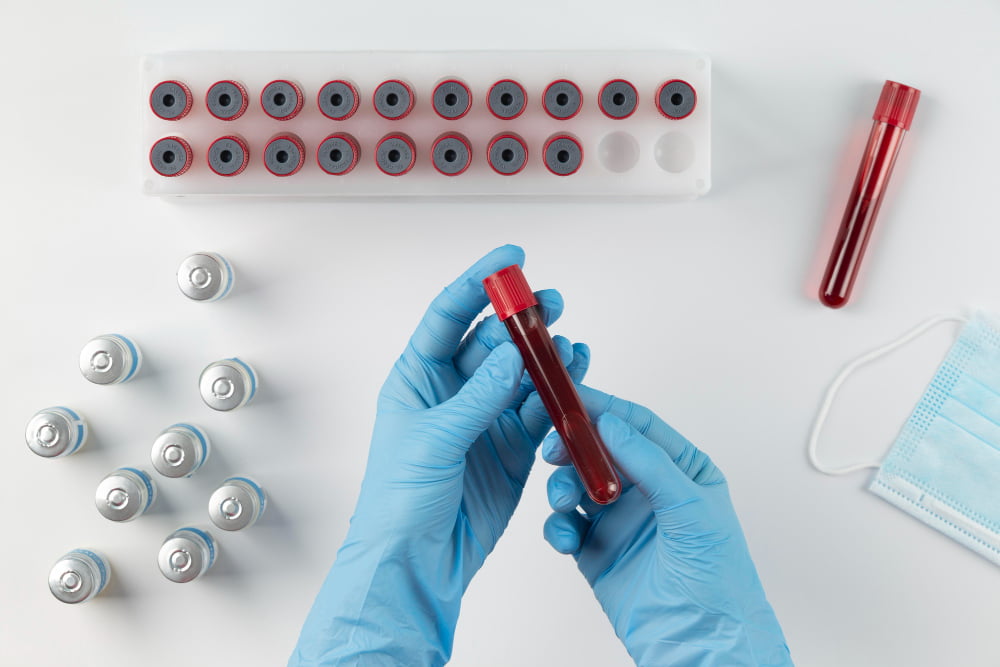Blood Type Calculator

Do you know your blood type?
Are you wondering what blood type your children could have?
With the help of a blood type calculator, you can easily determine the possible blood type of your children.
In this article, we’ll explore the ABO Blood Group System, Rh antigen and blood types, population distribution, and blood type and fertility.
We’ll also discuss the benefits of using a blood type calculator and tips for better sleep.
So, read on to learn more about the world of blood types and calculators.
Key Takeaways
- Blood type is determined genetically and inherited from parents.
- The child’s blood type is determined by both parents’ blood types.
- Parents with different blood types can have children with various blood types.
- The blood type calculator can be used to calculate the probabilities of inheriting specific blood types.
ABO Blood Group System
You’ve probably heard of the ABO blood group system, which consists of four main blood types: A, B, AB, and O. Each has different antigens on the red blood cell membrane, and the child inherits one allele from each parent.
To calculate the probabilities for the baby’s blood type, multiply the probabilities based on the parents’ blood types. You can use a blood type calculator for accurate results. It’s possible for a child to have a different blood type than both parents; the child’s blood type is determined by both parents’ blood types.
Knowing blood types is important for transfusions, and the Rh+ and Rh- groups also have specific donation and receiving rules. O positive is the most common at 35%, while AB negative is the rarest at 1%. Rh incompatibility can harm the fetus, so knowledge of Rh factor is critical before birth. Genuine and non-misleading information is encouraged on the topic.
The wake-up calculator helps to determine the optimal time to wake up for feeling well-rested, taking into account sleep cycles and recommended wake-up times. Using the calculator can help improve morning energy levels, establish a healthier sleep routine, and regulate the body’s internal clock.
To get the best sleep quality, avoid caffeine, create a calming bedtime routine, and exercise regularly. Explore more about blood and its functions, quiz on blood donation and procedures, and learn about blood group diets for individual blood types.
Rh Antigen and Blood Types
Building on the ABO blood group system, Rh antigen and blood types are determined by the presence of Rh antigen on the red blood cells. Rh+ indicates the presence of the antigen, while Rh- indicates its absence. This is used to calculate the probability of various blood types in children whose parents have different blood types. For example, if one parent is blood type A and the other is O, the child has a 50% chance of being type A and a 50% chance of being type O. Similarly, a child whose father is type A and mother is type B has a 25% chance of being type A, 25% chance of being type B, 25% chance of being type AB, and 25% chance of being type O.
The population distribution of Rh-positive people varies significantly by ethnicity, with higher numbers among white Europeans and lower numbers among African and non-European populations. Blood type can also affect fertility in women, with some studies suggesting a link to ovarian reserve. Knowing the blood type of both partners can be an important factor in family planning.
The Wake Up Calculator is an online tool that can help optimize sleep cycles, enabling users to wake up feeling well-rested. It takes into account the average time it takes to fall asleep and provides alternate wake-up times based on different sleep cycles. Establishing a consistent sleep schedule, avoiding blue light before bed, and exercising regularly can all help improve sleep quality.
Population Distribution
Frequently, the population distribution of Rh-positive people varies significantly by ethnicity. For example, among white Europeans, 16% are Rh-negative, while 84% are Rh-positive. In contrast, only 9 in 10,000 individuals in Africa have Rh-negative blood, and in non-African, non-European populations, only 1 in 10,000 individuals are Rh-negative. In the United States, approximately 15% of the population is Rh-negative, with 20% of European Americans and 5-10% of African Americans being Rh-negative.
Knowledge of a baby’s blood type is important for medical reasons, such as when planning for pregnancy or when using a baby’s blood type calculator. The calculator can be used to help determine a baby’s blood type based on the parents’ blood types. It’s important to note that mutations can give false conclusions, so it’s best to use the calculator for informational purposes only and not for paternity testing.
It is also critical to get the same or a compatible blood type for any transfusions or transplants. This knowledge is essential for medical professionals and those using a blood type calculator for their child. The calculator can help predict possible blood types for a baby based on the parents, and it’s important to consider the Rh factor (positive or negative) as well, such as O+ve or AB+ve or O-ve or AB-ve.
Blood Type and Fertility
Continuing on from Rh type in pregnancy, there’s another important consideration when it comes to blood type and fertility. Studies suggest a potential link between blood type and a woman’s fertility, as well as her ability to get pregnant. Knowing both partners’ blood type is important when planning for pregnancy.
Here are five key points to consider:
- Blood type may be associated with a woman’s fertility and ability to get pregnant.
- Calculate the probabilities based on both parents’ blood types.
- Transfusions and transplants aren’t the only situations where blood type matters.
- Establish a consistent sleep schedule and create a relaxing bedtime routine.
- Stress and anxiety, as well as alcohol consumption, can affect sleep quality.
It is essential to understand the implications of blood type when it comes to family planning. Knowing both partners’ blood type can help to ensure that the child receives the correct type of blood. It’s also important to ensure that the mother gets enough sleep and has a healthy sleep routine to promote better fertility.
ABO Blood Group Calculator
To further understand the importance of blood type, the ABO Blood Group Calculator helps to calculate the probability of a child’s blood type based on the parents’ blood types. Developed by the Medindia Content Team, this calculator has been reviewed by the Medindia Medical Review Team. It can be used to determine the different blood groups of a child based on the parents’ blood groups. It’s important to note that the calculator isn’t to be used for paternity testing as mutations can give false conclusions.
The ABO blood group system was first discovered by Dr. Karl Landsteiner in 1901. This system is based on the substances that are present on the surface of red blood cells. Knowing the blood group and the Rh factor is essential for medical reasons. It’s critical to get the same or compatible blood type for transfusion. The Rh factor is written as O+ve or AB+ve or O-ve or AB-ve.
The ABO Blood Group Calculator can be used to determine the probabilities of inheritance and the chance for each blood group. It takes into account the Rh+ and Rh- groups. The calculator also provides alternative wake-up times based on different sleep cycles. It’s beneficial for individuals with irregular sleep patterns, as it can help to establish a healthier sleep routine.
Rh Type in Pregnancy
Building on the previous subtopic, understanding the implications of blood type can be particularly important during pregnancy, especially when it comes to determining Rh compatibility. Rh incompatibility can cause complications for a developing fetus, so it’s important to know a mother’s Rh factor before birth. This can help in pregnancy planning and assessing potential risks.
Here are some tips to keep in mind when it comes to Rh type and pregnancy:
- Know your and your partner’s Rh factor before planning for pregnancy
- Rh incompatibility can cause complications for a fetus
- Rh factor can affect pregnancy and miscarriage
- Transfusions with incompatible blood types can be dangerous
- Rh compatibility should be considered during pregnancy planning
Frequently Asked Questions
How Do I Know My Blood Type?
You can determine your blood type by having a blood test done at your local doctor’s office. A sample of your blood will be taken and tested for the A, B, AB, and O antigens. These antigens will determine your blood type. Your doctor will also check for the Rh factor (positive or negative). This information will be used to determine your blood type.
You can also ask your parents or siblings about their blood types; you may share the same blood type as one of them.
Knowing your blood type is important for medical reasons, such as blood transfusions and organ donations.
Is It Safe to Receive Blood From Any Blood Type?
No, it isn’t safe to receive blood from any blood type. It’s important to make sure the blood type being received is compatible with the person receiving it.
A person with A blood type can only receive A, O, and AB blood types, while a person with B blood type can only receive B, O, and AB blood types.
People with AB blood type can receive any blood type, while people with O blood type can only receive O.
It’s also important to consider the Rh factor, as a person with Rh+ blood type can only receive Rh+ blood type and a person with Rh- blood type can receive either Rh+ or Rh- blood type.
What Is the Most Common Blood Type in the World?
The most common blood type in the world is O positive, accounting for around 35% of the population. O negative is the second most common, at 13%.
A positive is 30%, A negative 8%, B positive 8%, B negative 2%, AB positive 2%, and AB negative 1%.
Blood type is determined genetically and inherited from parents, and it’s important to know your blood type for medical reasons. Certain blood types can only receive from or donate to certain others, so it’s important to understand the specifics for each blood type.
How Can I Determine My Rh Factor?
You can determine your Rh factor by having a blood test. The Rh factor is a protein found on the surface of red blood cells. If the protein is present, you’re RhD positive, and if it’s absent, you’re RhD negative.
Knowing your Rh factor is important, as it can affect pregnancy and determine if blood transfusions are compatible. You may also need to know your Rh factor before certain medical procedures.
Talk to your doctor to learn more about your Rh factor and how it can affect your health.
Can My Blood Type Affect My Fertility?
Yes, your blood type can affect your fertility. It has been linked to a woman’s ovarian reserve and her ability to conceive.
Knowing your blood type and your partner’s blood type is essential when planning a pregnancy. Other factors such as stress, nutrition, lifestyle, and medications can also influence fertility.
Consider consulting your doctor to determine if your blood type is affecting your fertility.
Conclusion
Using a blood type calculator is a great way to understand the complexities of blood type inheritance.
It can also help you understand the Rh antigen and population distribution of Rh-positive people, as well as the influence of blood type on fertility.
With this information, you can make informed decisions about your health and that of your children.
So, take a few minutes to learn more about your blood type and use a calculator to gain a better understanding.








